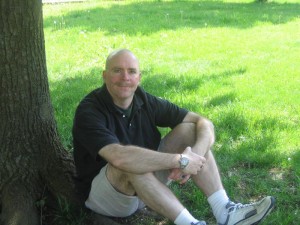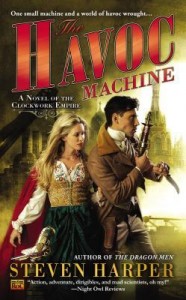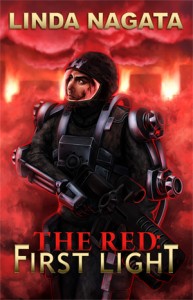 Steven Harper (Okay, Canadians, settle down–that’s Steven, not Stephen) is one of my colleagues from SF Novelists and his new novel, The Havoc Machine
Steven Harper (Okay, Canadians, settle down–that’s Steven, not Stephen) is one of my colleagues from SF Novelists and his new novel, The Havoc Machine, is the fourth novel in the Clockwork Empire series.
He Tweets, speaks Facebook, and has a web site about the Clockwork Empire series and his other writings here.
Here’s a picture of him alone (unless you count the tree) as he very kindly joins us today on Off My Lawn! to take on the myth of The Solitary Writer.
Marcel Proust famously lined the walls of his bedroom with cork to shut out the world because the slightest noise wrecked his concentration and stopped him from producing even a word. Writers, he claimed, must work in solitude. Indeed, writing by definition is a solitude-heavy profession laden with lonely people.
Virginia Woolf agreed with him, to an extent. Woolf maintained that in order for a woman to write fiction, she needed a certain amount of wealth and a room of her own. Solitude.
Oh, if only.
I’m a single father of three sons. During the time it took me to write the above words, I had two conversations. For the first, my youngest son danced into my bedroom office room wearing nothing but a Spider-Man cap and a smile while he sang, “See my butt!” to the tune of BEAUTY AND THE BEAST’s “Be Our Guest.” For the second, my middle son stormed in to complain that his little brother was singing naked in the hallway outside his room.
I wrote my steampunk novel THE HAVOC MACHINE under six months of these conditions and worse. While I was busily putting the adventures of Thad and Sofiya into words, I was interrupted for homework help, argument moderation, requests to play soccer, transportation to music lessons, and several bouts of “Hey Dad–are you busy?”
I can hear Virginia Woolf gleefully pointing out how right she was. See? All those interruptions just hurt writing! But here’s the thing:
Every other weekend, the boys go to their mom’s house, and I =do= get solitude. A whole weekend of it. You’d think I’d be rolling up my sleeves and really pounding out the words, right?
Nope. I don’t produce any more wordage when the boys are away than I do when they’re at home.
I think it’s the interruptions that allow us to write. They pull us into the world, keep us grounded in reality so we can produce proper fiction. Utter solitude might have worked for Proust in his cork-lined room, and Woolf may have yearned for a room of her own, but ultimately, it’s the writing, not the situation, that create the book.
 About The Havoc Machine
About The Havoc Machine
In a world riddled with the destruction of men and machines alike, Thaddeus Sharpe takes to the streets of St. Petersburg, geared toward the hunt of his life….
Thaddeus Sharpe’s life is dedicated to the hunting and killing of clockworkers. When a mysterious young woman named Sofiya Ekk approaches him with a proposition from a powerful employer, he cannot refuse. A man who calls himself Mr. Griffin seeks Thad’s help with mad clockwork scientist Lord Havoc, who has molded a dangerous machine. Mr. Griffin cares little if the evil Lord lives or dies; all he desires is Havoc’s invention.
Upon Thad’s arrival at Havoc’s laboratory, he is met with a chilling discovery. Havoc is not only concealing his precious machine; he has been using a young child by the name of Nikolai for cruel experiments. Locked into a clockwork web of intrigue, Thad must decipher the dangerous truth surrounding Nikolai and the chaos contraption before havoc reigns….







